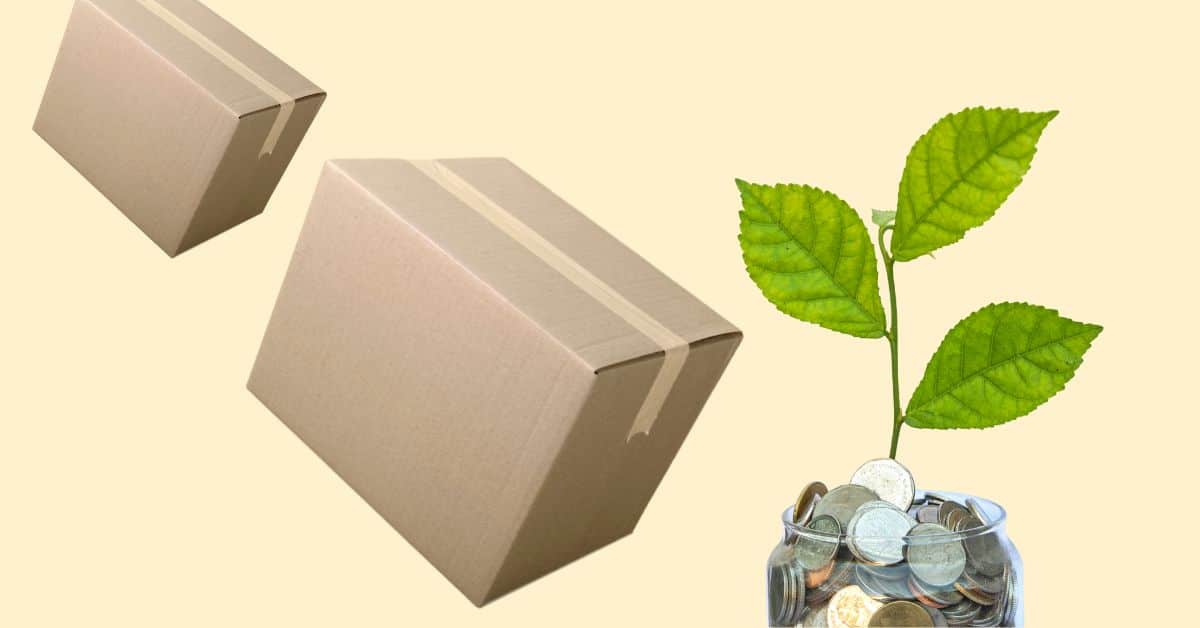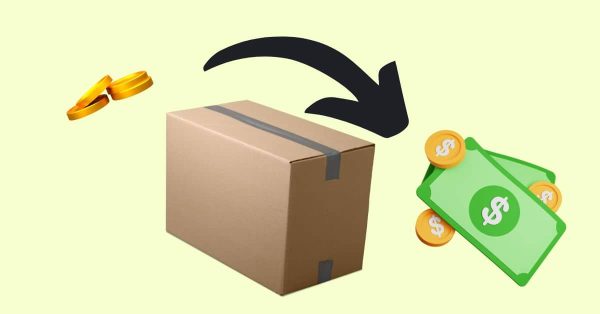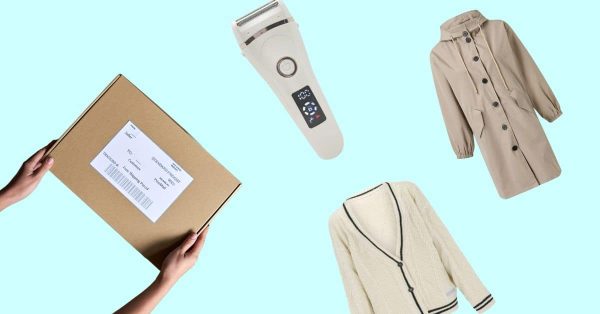If you’re dreaming of starting an online store, you’ll want to know what dropshipping startup costs are. The answer is not a lot.
Dropshipping is a retail business model where you don’t need to invest money in buying or storing inventory. It also saves time because you don’t have to manage stock or hire staff to handle orders. All of this makes starting a dropshipping business for free super easy.
However, that’s kind of like saying you could make it to the top of Mount Everest wearing only sneakers, shorts, and a tee shirt; it’s possible but hardly ideal.
Investing in the right equipment, tools, and other considerations will make the process a whole lot easier.
In this article, we’re going to take a look at just how much you might need to invest to ensure the success of your dropshipping business.

What costs can you expect to start a successful dropshipping business?
If you’re thinking of running a dropshipping store, here are some dropshipping startup costs you might want to think about:
- Fees for registering your business and getting a license.
- Costs for using an eCommerce platform or selling on a marketplace.
- Money you’ll spend on getting a domain and hosting.
- Expenses for marketing your products.
- The cost of finding and getting products from suppliers.
- Taxes that you might need to pay.
- Any fees your suppliers may charge.
- Costs for shipping the products to customers.
Luckily, there are lots of tools online for dropshipping, so you don’t need a ton of money to start. You can even get going with just a few dollars and build up your business gradually. As little as $50 to $150 can give your store a strong start.
As experts in the dropshipping business model, Printify can help you understand the costs involved in this helpful article.

Balancing your dropshipping startup costs
If you’re considering running a dropshipping business, here’s a breakdown of the costs you should be aware of and how to balance them.
Business registration and license fees
This involves the costs associated with legally registering your business and obtaining the necessary licenses. These steps not only establish your business’s legitimacy but also contribute to a smooth and lawful operation.
eCommerce platform or marketplace costs
Choosing the right platform is crucial. Whether it’s Shopify, WooCommerce, or prominent marketplaces like Amazon and eBay, each option may come with associated fees. These platforms offer valuable tools for managing and showcasing your products, contributing to a seamless online store setup.
Domain and hosting expenses
Establishing an online presence involves registering a domain and securing hosting services. Typically, domain registration fees range from $10 to $15. Additionally, monthly web hosting costs vary between $2 and $4. These expenses are fundamental to making your store accessible on the internet.
Marketing expenses
Effectively promoting your products is essential for business growth. Allocate funds for various marketing strategies, such as social media advertising, influencer collaborations, and email marketing. These efforts contribute to expanding your brand’s reach and fostering customer engagement.
As a side note, one of the most important aspects of your marketing campaigns will be understanding your CPA (your Cost Per Acquisition – or how much your campaigns cost you for every new customer).
There are many formulas for calculating the CPA for your online store but the most common – and the simplest – is to simply divide your total marketing spend by the number of new acquisitions. $100 marketing spend for 10 new customers means your CPA is $10.
And if you want a FREE dropshipping CPA calculator, you can download it here.
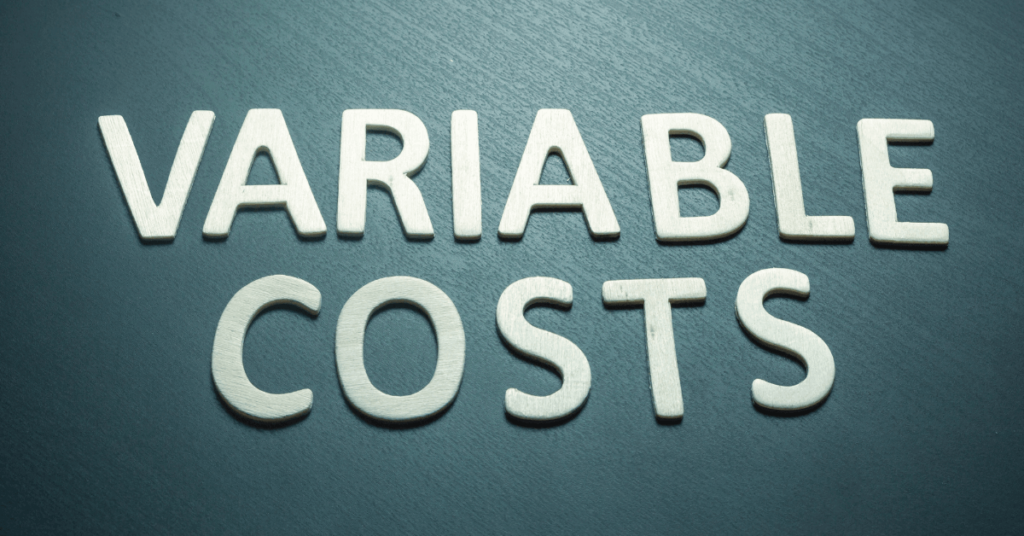
Product sourcing costs
The core of dropshipping lies in sourcing quality products from suppliers. This process incurs various costs, including negotiating prices, obtaining product samples, and potentially making upfront payments. Ensuring reliable and cost-effective sourcing is pivotal for the success of your business.
Taxes
Navigating tax considerations is crucial for dropshippers. Depending on your business location and scale, you may be subject to specific tax obligations. Access information from your national revenue service to stay compliant and avoid unexpected financial setbacks.
Supplier fees
Collaborating with dropshipping suppliers is a key aspect of your online business. Some suppliers may charge fees for their services or for using their dropshipping facilities. Understanding and accounting for these fees is essential for maintaining transparent and mutually beneficial relationships.
Shipping costs
Efficiently managing the shipping process is vital for customer satisfaction. Shipping costs, influenced by factors like method, distance, and product weight, should be carefully calculated. Awareness of these expenses allows for accurate pricing and budgeting.
It’s hugely important to be aware of these costs to manage your money well and make sure your dropshipping business survives and succeeds. Keep in mind that if you’re careful with your budget and are aware of these costs, your dropshipping endeavors are more likely to be susuccesful.

Variable costs and scaling your ecommerce business
The beautiful thing about owning a dropshipping business is that what you want to spend, and how fast you scale your business is completely up to you. This means that your initial outlay and what you spend come under the heading of variable costs.
Think of variable costs as the parts of spending that can be a bit flexible when you kick off your dropshipping journey. You get to decide what fits your style and budget.
When your dropshipping journey starts picking up speed, you can slowly make it bigger – commonly referred to as scaling. And here’s the beauty: as your business grows, you’re in control of how much money you invest in its growth.
Variable costs give you the freedom to start with a budget that suits you, and scaling lets you grow your business step by step, tweaking things along the way. It’s like a personalized plan for the financial elements of dropshipping.

Tools to help grow your dropshipping business
Let’s start with five of the top ecommerce platforms for your dropshipping business.
- WooCommerce
- Shopify
- ShopBase
- Big Commerce
- Shift4Shop
WooCommerce
The WooCommerce ecommerce platform, built on WordPress, is a handy tool for anyone wanting to run a successful dropshopping business. Plus, launching a stunning online store that converts is made easy with Woo Express.
WooCommerce comes with a 14-day free trial with the opportunity to upgrade to any paid plan for $1 for the first three months.
Shopify
Shopify is one of the world’s most loved platforms to kick off your online dropshipping business. Set-up is super easy, and the platform comes packed with fantastic features that make running your store a walk in the park.
Plus, Shopify lets you start your journey with a 3-day free trial with a full subscription for only $1 per month for the first 3 months.
ShopBase
ShopBase is an all-in-one ecommerce management solution for your dropshopping business that lets you focus on all the really important stuff that helps to grow your profits.
Try a 14-day free trial and if you like it you can upgrade to an enhanced monthly plan starting at only $19 per month.
According to business analysts, Greandviewresearch, the global dropshipping market size was estimated at USD 225.99 billion in 2022 and is expected to reach USD 287.36 billion in 2023.
BigCommerce
If you’ve already found some success with your dropshipping business and you want to take your ecommerce business to the next level, BigCommerce has a whole range of sophisticated SaaS tools to handle almost every task, from managing dropshipping suppliers to handling returns.
With a range of pricing solutions, you can find the package that’s right for you here.
Shift4Shop
Creating a successful website for your business is a breeze with Shift4Shop. The platform’s all-in-one eCommerce solution comes with a feature-packed website builder, tools for managing products and orders, customer marketing features, and lots more for your dropshipping business.
Shift4Shop is free for advanced dropshipping business owners who generate a minimum of $500 monthly.

Order processing and supplier management tools
OK, so you have your dropshipping business platform in place and are ready for the customers to come rolling in. But first, you’re going to need some tools to help you with order processing and managing your dropshipping suppliers. There are many software packages to choose from that let you manage every aspect of your e-commerce store; here are just a few.
- DSers
- Spocket
- SaleHoo
- Modalyst
- Doba
- Inventory Source
- Wholesale Central
- Worldwide Brands
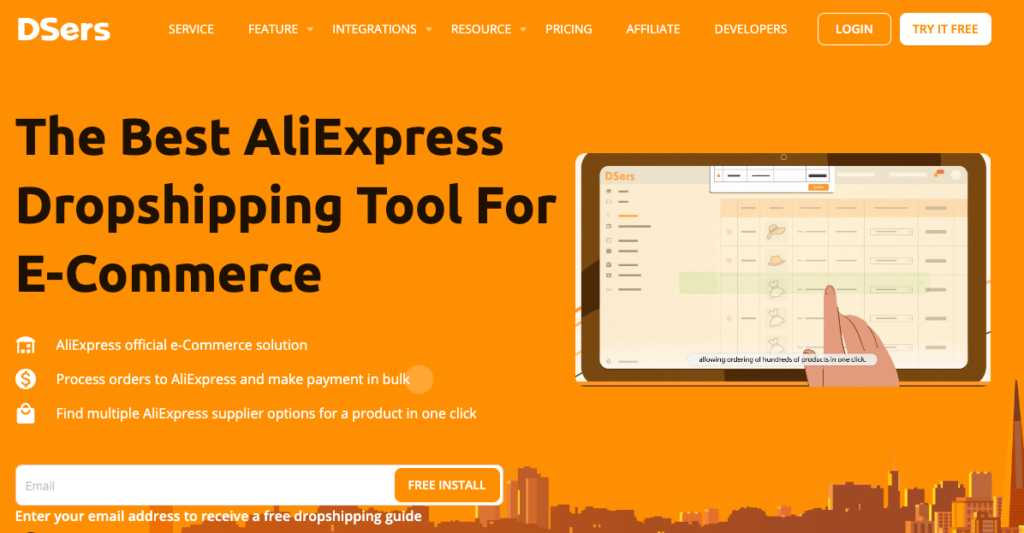
DSers
If you’re using AliExpress as your product dropshipping supplier, DSers is the official AliExpress dropshipping business software that lets dropshipping store owners source all of their supplier options, process orders, or make bulk payments. DSers is available for Shopify, WooCommerce, and Wix and connects with AliExpress.
DSers offers a free basic account plus an Advanced account for $19.99 per month, $49.99 per month for Pro, and $499 for the Enterprise version.
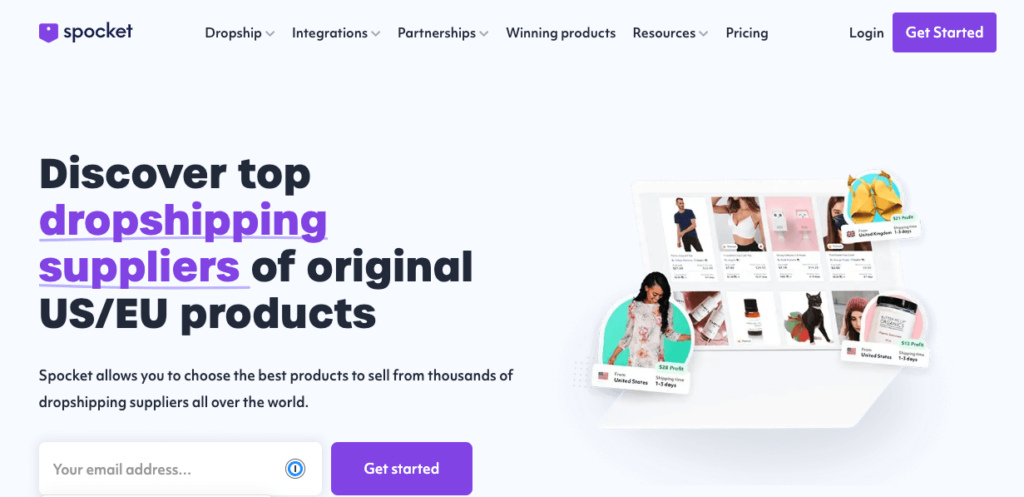
Spocket
Spocket searches thousands of suppliers around the world and lets dropshipping store owners source the very best products for their online store. Seamlessly integrating with any Shopify store, Sprocket syncs with your online store and all orders with one mouse click.
Spocket comes with a free 3-day trial, $24.99 for a monthly Starter account, $49.99 for a Pro account, and $99.99 for an Empire account.
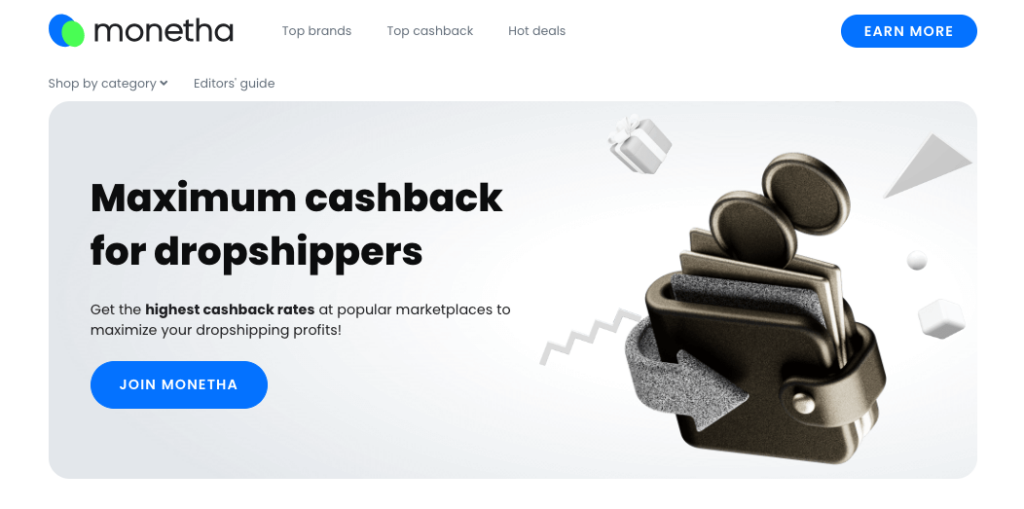
Monetha
Monetha is a dropshippers best friend, a compact and easy to use app that let’s you earn even extra money from every sale you make. Simply by downloading the free app, store owners are rewarded with points for every purchase made from over 1,500 online stores. The points can then be used to exchange for gift cards from thousands of the world’s most well-known retailers. Or they can be used to invest in cryptocurrencies even to donate to a list of selected charities.
Monetha is a free-to-download app with no additional costs.
SaleHoo
SaleHoo serves as a dropshipping business platform that links sellers with trustworthy dropshipping suppliers and boasts a database of over 8,000 suppliers and 2.5 million products. Explore trending items, sell-through rates, and average profit margins.
No free trial is available. Basic account at $27 per month, Premium account at $97.
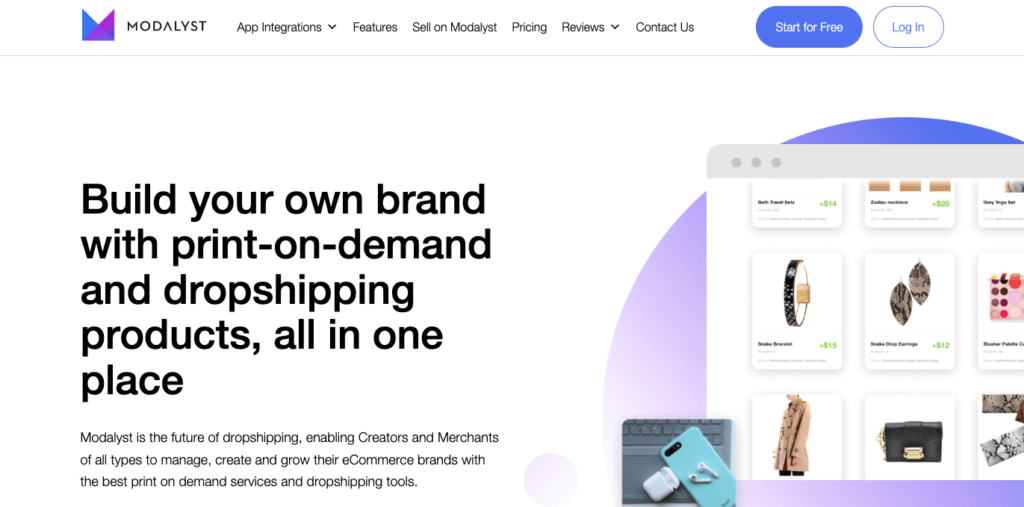
Modalyst
Modalyst easily integrates with Shopify and streamlines one-click dropshipping operations. Shop dropshipping store owners can use the management software to discover designer brands, eco-friendly suppliers, private label manufacturers, and AliExpress sellers as part of their online business.
Hobby account is free, Startup account costs $35 per month, and Pro account is priced at $90.
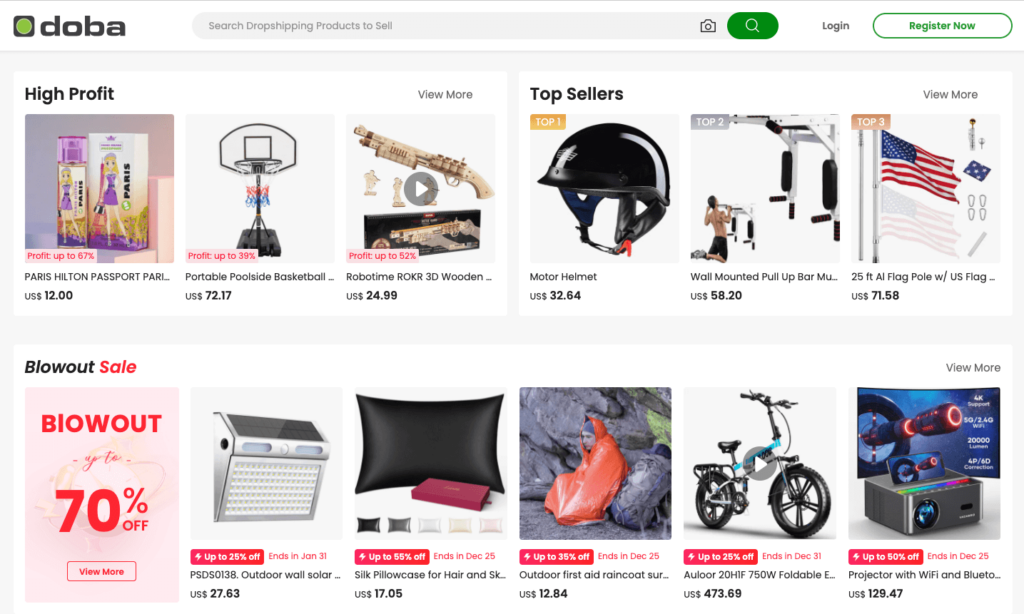
Doba
Doba helps dropshipping store owners to stay current with the latest product trends and provides access to thousands of products spanning various verticals.
Enjoy a 30-day free trial. The Startup account is free, the Business account is $49.99 per month, and the Enterprise account is $299.99 per month.
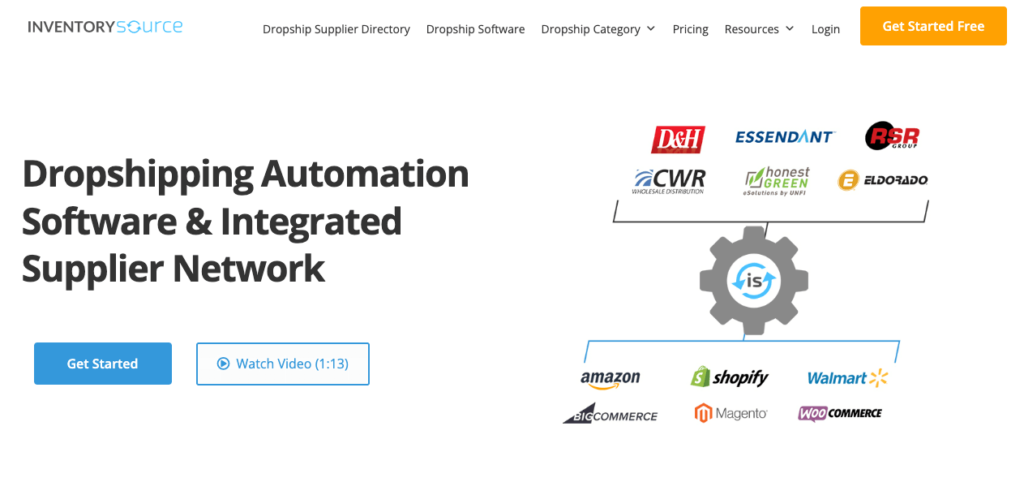
Inventory Source
Inventory Source offers a complete solution that automates the entire dropshipping business process. It handles product uploads, inventory synchronization, inventory management, and order routing with suppliers directly to your online store.
The Directory account is free, while the full software package is available at $99 per month.
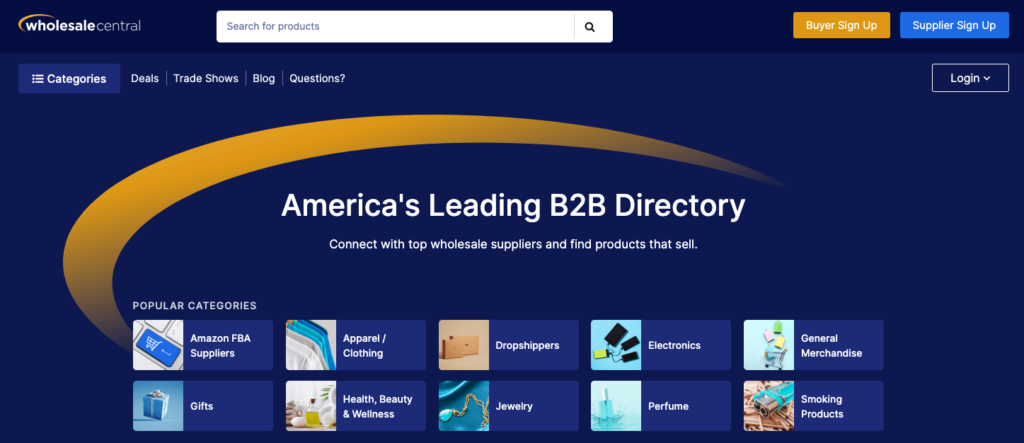
Wholesale Central
Wholesale Central is an extensive product directory for dropshipping store owners to explore and discover the right products for their business model. It offers a wide range of categories, including arts and crafts supplies, handbags, tools, and toys, allowing you to discover trending products that match your unique dropshipping business.
Wholesale Central is free to use.
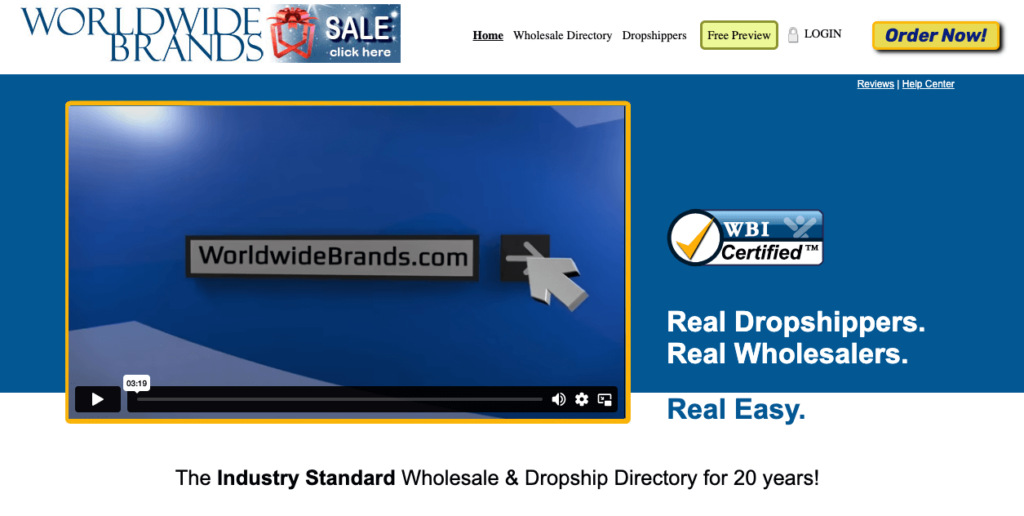
Worldwide Brands
Worldwide Brands, with two decades of ecommerce store experience, is among the oldest dropshipping platforms. Sellers can explore thousands of wholesale products across various categories from established suppliers worldwide.
Worldwide Brands comes with a free preview, and a lifetime membership is priced at $299.

How to optimize your dropshipping business costs
Dropshipping owners are always on the lookout for new ways to create a successful dropshipping business without having to take out a second mortgage.
- Negotiate
- Go lean
- Remove unnecessary costs
First off, negotiate with suppliers. Discuss prices, shipping costs, and terms – it can save you a lot of money in the long term.
Next up, embrace the process of lean marketing. This simply means focusing on what really works. Learn as much as you can about cost-effective strategies like social media marketing costs and influencer collaborations. It’s like putting your money where it matters most – reaching your audience without breaking the bank.
And here’s a golden rule you should constantly consider: avoid unnecessary expenses. It’s like steering clear of any unexpected financial potholes. Assess tools and services—only invest in what truly adds value to your business. This way, you’re not just spending; you’re investing wisely.
By negotiating, going lean on marketing, and cutting out unnecessary expenses, you’re not just saving money; you’re optimizing your costs and increasing the chances of greater success for your ecommerce store.

Breaking down the dropshipping costs
As we’ve already discovered, starting a dropshipping business doesn’t have to be expensive.
In this short article, we’ve examined the costs involved, shared tips on how to manage money wisely, and shown that you can embark into dropshipping without the backing of a massive budget.
The idea that you need a ton of money for dropshipping is just a myth. With smart planning and careful decisions, anyone can enter the world of dropshipping and turn their business dreams into reality.
So, whether you’re working with a tight budget or a bit more, the doors to dropshipping are wide open, waiting for you to explore and make your mark in the world of online business.
